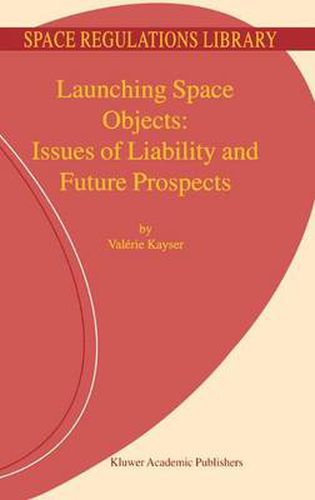Readings Newsletter
Become a Readings Member to make your shopping experience even easier.
Sign in or sign up for free!
You’re not far away from qualifying for FREE standard shipping within Australia
You’ve qualified for FREE standard shipping within Australia
The cart is loading…






This title is printed to order. This book may have been self-published. If so, we cannot guarantee the quality of the content. In the main most books will have gone through the editing process however some may not. We therefore suggest that you be aware of this before ordering this book. If in doubt check either the author or publisher’s details as we are unable to accept any returns unless they are faulty. Please contact us if you have any questions.
Launch activities performed by private entities deal with a complex legal environment. The Space Treaties provide a general liability framework. Launch participants are subject to regulatory or institutional control, and to domestic liability laws. Specific contractual practice has developed due to insurance limitations, the inter-participants’ waivers of liability and claims. This book synthesizes information on the norms of play, to allow the grasp of their relative weight and interactions in the assessment of liability risk for launch activities. It reveals a legal framework presently lacking sufficient predictability for an efficient liability risk management: the waivers of liability suffer weaknesses as do all such clauses, and lack uniformity and reliability; and the Space Treaties contain ambiguous terms preventing predictable determination of the States responsible for authorizing and supervising launch activities and for damage compensation, and do not reflect the liability of launch operators. This book offers suggestions of new approaches for: harmonizing waivers of liability to improve their consistency, validity and flow-down; and improving the Space Treaties for their implementation to non-governmental launch activities. In the launch community, the need for lawmaking is less compelling than in fields such as aviation. Nevertheless, adjustments to the present framework are proposed through model clauses and an international instrument, for further thinking and contribution by those sharing the opinion that creative lawmaking is needed now to prepare for tomorrow’s endeavors.
$9.00 standard shipping within Australia
FREE standard shipping within Australia for orders over $100.00
Express & International shipping calculated at checkout
This title is printed to order. This book may have been self-published. If so, we cannot guarantee the quality of the content. In the main most books will have gone through the editing process however some may not. We therefore suggest that you be aware of this before ordering this book. If in doubt check either the author or publisher’s details as we are unable to accept any returns unless they are faulty. Please contact us if you have any questions.
Launch activities performed by private entities deal with a complex legal environment. The Space Treaties provide a general liability framework. Launch participants are subject to regulatory or institutional control, and to domestic liability laws. Specific contractual practice has developed due to insurance limitations, the inter-participants’ waivers of liability and claims. This book synthesizes information on the norms of play, to allow the grasp of their relative weight and interactions in the assessment of liability risk for launch activities. It reveals a legal framework presently lacking sufficient predictability for an efficient liability risk management: the waivers of liability suffer weaknesses as do all such clauses, and lack uniformity and reliability; and the Space Treaties contain ambiguous terms preventing predictable determination of the States responsible for authorizing and supervising launch activities and for damage compensation, and do not reflect the liability of launch operators. This book offers suggestions of new approaches for: harmonizing waivers of liability to improve their consistency, validity and flow-down; and improving the Space Treaties for their implementation to non-governmental launch activities. In the launch community, the need for lawmaking is less compelling than in fields such as aviation. Nevertheless, adjustments to the present framework are proposed through model clauses and an international instrument, for further thinking and contribution by those sharing the opinion that creative lawmaking is needed now to prepare for tomorrow’s endeavors.